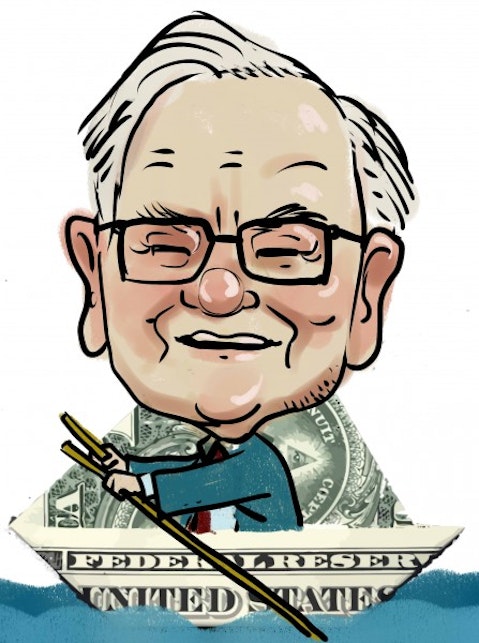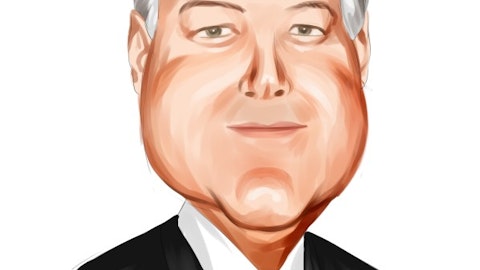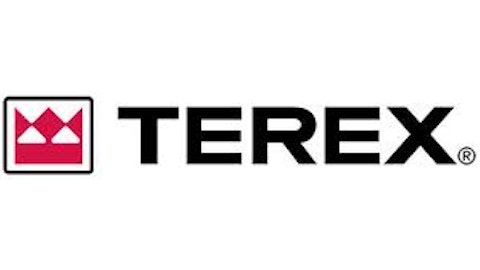The second quarter of Deere & Company (NYSE:DE)’s fiscal year ended in April, with the company experiencing a 9% increase in revenue versus a year earlier but only a 3% rise in earnings as net margins declined. During the quarter (and during fiscal Q1 as well), growth was driven by the agriculture and turf business, where a double-digit percentage increase in sales offset declines in the much smaller construction and forestry segment. Deere & Company (NYSE:DE) has been buying back shares, and so earnings per share did increase at a somewhat faster rate. The good Q2 numbers built on good performance during the first quarter of the fiscal year, to the point that the six-month period as a whole saw 13% EPS growth from levels a year ago. There has been a large buildup in receivables and inventory, with cash flow from operations being negative as a result, but that appears to be seasonal in nature.
At its current market capitalization of $32 billion, Deere & Company (NYSE:DE) trades at 10 times trailing earnings- fairly cheap considering the recent financial performance. Some analysts believe that agriculture is poised to be a growth industry as the world population grows and as richer populations in developing countries consumer more meat (which is more agriculturally intensive to produce), which could help Deere & Company (NYSE:DE) as well as its peers. Consensus forecasts are for moderate earnings growth going forward, as shown by the forward P/E of 9 and a five-year PEG ratio of about 1.
We maintain a database of quarterly 13F filings from hedge funds and other notable investors, primarily to help us in developing investment strategies (we have found, for example, that the most popular small cap stocks among hedge funds earn an average (excess return of 18 percentage points per year) but also to track interest among hedge funds in individual stocks. Warren Buffett’s Berkshire Hathaway owned close to 4 million shares at the end of March (see Buffett’s stock picks) according to the holding company’s filing, while billionaire Mario Gabelli’s GAMCO Investors reported a position of 1.5 million shares (find Gabelli’s favorite stocks).
Other agricultural equipment companies include AGCO Corporation (NYSE:AGCO) and Lindsay Corporation (NYSE:LNN). Similarly to Deere & Company (NYSE:DE), AGCO has been experiencing higher revenues but not quite as good results in terms of net income (in fact, earnings fell slightly in its most recent quarter compared to the same period in the previous year). The company is valued at 10 times its trailing earnings, in line with Deere & Company (NYSE:DE). Lindsay features a premium to these companies, with trailing and forward P/Es in the teens, though recent reports have shown impressive improvements on both top and bottom lines. Still, a number of market players are bearish as shown by the fact that 22% of the float is held short.
We can also compare Deere to Caterpillar Inc. (NYSE:CAT) and to CNH Global NV (NYSE:CNH). Caterpillar seems to be suffering from reduced demand for construction and mining equipment, with double-digit percentage declines in both revenue and net income last quarter compared to the first quarter of 2012. The stock is down 2% in the last year against a rising market as a result, which has brought the stock’s dividend yield close to 3% at current dividend levels and its trailing P/E to 11- a small premium over Deere. Still, we think that we’d avoid it at least for now. In quantitative terms CNH looks quite cheap, with trailing and forward earnings multiples of 8 and with a five-year PEG ratio of 0.7. The company has been seeing slight revenue growth, and somewhat wider margins, though we would warn investors that statistically CNH is highly correlated with market indices as the stock’s beta is 2.7.
We’d be interested in looking into Lindsay and trying to understand what the bear case for the stock is, though compared to AGCO we think that we would prefer Deere on the basis of better recent results and a somewhat better brand name. We also would call CNH at least a prospective value stock, and if its business continues to hold up it would be worth considering at these prices.
Disclosure: I own no shares of any stocks mentioned in this article.






